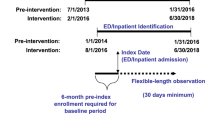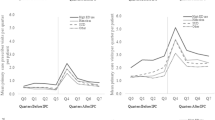Abstract
Youth with mental illness struggle to receive essential behavioral health care. One obstacle is denial of coverage by insurance. In California, managed care consumers may apply for independent medical review (IMR) which potentially overturns an insurance denial through the California Department of Managed Healthcare (CDMHC). The authors aim to analyze IMR appeals for psychiatric treatment among adolescents and elucidate factors associated with obtaining coverage of care. We performed an analysis to identify factors that are associated with depression and substance use disorder (SUD) treatment claim denials in 11–20-year-olds from 2001 to 2022 using CDMHC data. Logistic regression modeling was used to identify specific factors related to claim characteristics and medical society instruments that are significantly associated with overturning a denial by IMR. Behavioral health IMRs are overturned at a higher rate than non-behavioral health claims. 54.5% of those with depression and 36.3% of those with SUD initially denied care coverage were overturned by IMR. For those seeking depression treatment, we found a significantly greater odds of overturn by IMR if there was a reference of CALOCUS [1.64, 95%CI (1.06–2.5)]. The odds of a SUD treatment denial being overturned was significantly greater if referencing CALOCUS [3.85 (1.54–9.62)] or ASAM [2.47, [4.3 (1.77–10.47)]. After the standardized implementation of illness severity tools in IMRs, the odds of a medically necessary claim being overturned was 2.5 times higher than before the standards. With a high percentage of claims being overturned after IMR, the findings suggest that health plans inappropriately deny medically necessary behavioral health treatment. The use of medical society instruments was associated with higher odds of overturning a denial. The recent decision of CDMHC to implement standard use of CALOCUS and similar illness severity criteria is supported by our findings and may facilitate more equitable care.

Similar content being viewed by others
References
Angarita, G. A., Reif, S., Pirard, S., Lee, S., Sharon, E., & Gastfriend, D. R. (2007). No-Show for treatment in substance abuse patients with comorbid symptomatology: Validity results from a controlled trial of the ASAM patient placement criteria. Journal of Addiction Medicine,1(2), 79–87. https://doi.org/10.1097/ADM.0b013e3180634c1d
APL 21–002-implementation of Senate Bill 855, Mental Health and Substance Use Disorder Coverage. (2021).
Arakelyan, M., Freyleue, S., Avula, D., McLaren, J. L., O’Malley, A. J., & Leyenaar, J. K. (2023). Pediatric mental health hospitalizations at Acute Care hospitals in the US, 2009–2019. Journal of the American Medical Association,329(12), 1000–1011. https://doi.org/10.1001/jama.2023.1992
Bazargan, M., Cobb, S., & Assari, S. (2021). Discrimination and medical mistrust in a racially and ethnically diverse sample of California adults. Annals of Family Medicine,19(1), 4–15. https://doi.org/10.1370/afm.2632
Bommersbach, T. J., McKean, A. J., Olfson, M., & Rhee, T. G. (2023). National trends in mental health-related emergency department visits among youth, 2011–2020. Journal of the American Medical Association,329(17), 1469–1477. https://doi.org/10.1001/jama.2023.4809
Costello, E. J., He, J. P., Sampson, N. A., Kessler, R. C., & Merikangas, K. R. (2014). Services for adolescents with psychiatric disorders: 12-Month data from the national comorbidity survey-adolescent. Psychiatric Services,65(3), 359–366. https://doi.org/10.1176/appi.ps.201100518
Chuang, K. H., Aubry, W. M., & Dudley, R. A. (2004). Independent medical review of health plan coverage denials: Early trends. Health Aff (Millwood),23(6), 163–169. https://doi.org/10.1377/hlthaff.23.6.163
Davis, M., Yelton, S., Katz-Leavy, J., & Lourie, I. S. (1995). Unclaimed children revisited: The status of state children’s mental health service systems. Journal of Mental Health Administration,22(2), 147–166. https://doi.org/10.1007/bf02518755
DMHC IMR Data, 2001-Current.
Elmquist, J. M., Melton, T. K., Croarkin, P., & McClintock, S. M. (2010). A systematic overview of measurement-based care in the treatment of childhood and adolescent depression. Journal of Psychiatric Practice,16(4), 217–234. https://doi.org/10.1097/01.pra.0000386908.07160.91
Fallon, T. J., & Dogin, J. (2005). Public sector dynamics for child mental health. In T. P. C. Salguero (Ed.), Community Child and Adolescent Psychiatry: A Manual of Clinical Practice Andconsultation (pp. 17–30). American Psychiatric Press Inc.
Foote, S. B., Virnig, B. A., Bockstedt, L., & Lomax, Z. (2007). External review of health plan denials of mental health services: Lessons from Minnesota. Administration and Policy in Mental Health,34(1), 38–44. https://doi.org/10.1007/s10488-006-0074-y
Healthcare, C. D. M. (2022). 10/30/2019). DMHC Protects Consumers’ Health Care Rights [Youtube Video]. https://youtu.be/xsE52CLPOcQ.
Herron, A. J., Brennan, T., American Society of Addiction Medicine. (2015). The ASAM Essentials of Addiction Medicine (2nd ed.). Wolters Kluwer.
Hoagwood, K. E., Essock, S., Morrissey, J., Libby, A., Donahue, S., Druss, B., Finnerty, M., Frisman, L., Narasimhan, M., Stein, B. D., Wisdom, J., & Zerzan, J. (2016). Use of pooled state administrative data for mental health services research. Administration and Policy in Mental Health,43(1), 67–78. https://doi.org/10.1007/s10488-014-0620-y
Huffine, C., Jewell, S., Hutton, C., & Sowers, W. (2010). CALOCUS Child and Adolescent Level of Care Utilization System. American Association of Community Psychiatrists.
Janice, L., Cooper, Y. A., Masi, R., Banghart, P., Dababnah, S., Douglas-Hall, A., Tavares, A., & Stagman, Shannon. (2010). Unclaimed Childred Revisited: California Case Study. Columbia University.
Kaminer, Y., Simkin, D. R., & Bagot, K. S. (2019). Substance-Related Disorders in Adolescents. In M. H. Ebert, J. F. Leckman, & I. L. Petrakis (Eds.), Current Diagnosis & Treatment: Psychiatry, 3e. McGraw-Hill Education. https://accessmedicine.mhmedical.com/content.aspx?aid=1158263144
Mark, T. L., Hinde, J. M., Barnosky, A., Joshi, V., Padwa, H., & Treiman, K. (2021). Is implementation of ASAM-based addiction treatment assessments associated with improved 30-day retention and substance use? Drug and Alcohol Dependence, 226, 108868. https://doi.org/10.1016/j.drugalcdep.2021.108868
Mee-Lee, D., American Society of Addiction Medicine. (2013). The ASAM Criteria: Treatment for Addictive, Substance-Related, and Co-occurring Conditions (3rd ed.). American Society of Addiction Medicine.
Mericle, A. A., Arria, A. M., Meyers, K., Cacciola, J., Winters, K. C., & Kirby, K. (2015). National trends in adolescent substance use disorders and treatment availability: 2003–2010. Journal of Child & Adolescent Substance Abuse,24(5), 255–263. https://doi.org/10.1080/1067828x.2013.829008
Merikangas, K. R., & McClair, V. L. (2012). Epidemiology of substance use disorders. Human Genetics,131(6), 779–789. https://doi.org/10.1007/s00439-012-1168-0
Mora Ringle, V. A., Hickey, J. S., & Jensen-Doss, A. (2019). Patterns and predictors of compliance with utilization management guidelines supporting a state policy to improve the quality of youth mental health services. Children and Youth Services Review,96, 194–203. https://doi.org/10.1016/j.childyouth.2018.11.035
Padwa, H., Mark, T. L., & Wondimu, B. (2022). What’s in an ASAM-based assessment? Variations in assessment and level of care determination in systems required to use ASAM patient placement criteria. Journal of Addiction Medicine,16(1), 18–26. https://doi.org/10.1097/adm.0000000000000804
Sharon, E., Krebs, C., Turner, W., Desai, N., Binus, G., Penk, W., & Gastfriend, D. R. (2003). Predictive validity of the ASAM patient placement criteria for hospital utilization. Journal of Addictive Diseases,22(Suppl 1), 79–93. https://doi.org/10.1300/j069v22s01_06
Sowers, W., Pumariega, A., Huffine, C., & Fallon, T. (2003). Level-of-care decision making in behavioral health services: The LOCUS and the CALOCUS. Psychiatric Services, 54(11), 1461–1463. https://doi.org/10.1176/appi.ps.54.11.1461
Theodore Fallon, A. P., Sowers, W., Klaehn, R., Huffine, C., Vaughan, T., Winters, N., Chenven, M., Marx, L., Zachik, A., Heffron, W., & Grimes, K. (2006). A level of care instrument for children’s systems of care: Construction, reliability and validity. Journal of Child and Family Studies,15(2), 143–155. https://doi.org/10.1007/s10826-005-9012-y
Walker, S. C., Gubner, N., Iztguttinov, A., Rodriguez, F., Davis, P., Lyon, A., Kerns, S., Bruns, E., Qian, J., & Sedlar, G. (2021). The implementation potential of a method to monitor empirically-supported children’s mental health treatment through claims data. Bmc Health Services Research,21(1), 1349. https://doi.org/10.1186/s12913-021-07317-z
Winters, K. C., & Kaminer, Y. (2008). Screening and assessing adolescent substance use disorders in clinical populations. Journal of the American Academy of Child and Adolescent Psychiatry,47(7), 740–744. https://doi.org/10.1097/CHI.0b013e31817395cf
Yin, H. S., Johnson, M., Mendelsohn, A. L., Abrams, M. A., Sanders, L. M., & Dreyer, B. P. (2009). The health literacy of parents in the United States: A nationally representative study. Pediatrics,124(Suppl 3), S289-298. https://doi.org/10.1542/peds.2009-1162E
Funding
None
Author information
Authors and Affiliations
Corresponding author
Ethics declarations
Conflict of interest
The authors have not disclosed any competing interests.
Additional information
Publisher’s Note
Springer nature remains neutral with regard to jurisdictional claims in published maps and institutional affiliations.
Previous Presentations: State University of New York Downstate Research Day 2022 Brooklyn, NY April 6th, 2022 AACAP Annual Meeting Toronto, CA, October 17, 2022.
Mitchell Bayne and Isabella Chirico are considered as co-first authors.
Supplementary Information
Below is the link to the electronic supplementary material.
Rights and permissions
Springer Nature or its licensor (e.g. a society or other partner) holds exclusive rights to this article under a publishing agreement with the author(s) or other rightsholder(s); author self-archiving of the accepted manuscript version of this article is solely governed by the terms of such publishing agreement and applicable law.
About this article
Cite this article
Bayne, M., Chirico, I., Wei, L. et al. Impact of Illness Severity Tools on Adolescent Psychiatric Managed Care in California. Adm Policy Ment Health 51, 162–171 (2024). https://doi.org/10.1007/s10488-023-01323-5
Accepted:
Published:
Issue Date:
DOI: https://doi.org/10.1007/s10488-023-01323-5




